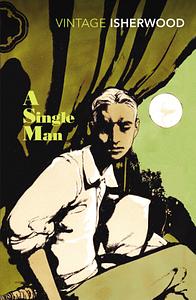You need to sign in or sign up before continuing.
Take a photo of a barcode or cover
emotional
reflective
relaxing
sad
fast-paced
Plot or Character Driven:
Character
Strong character development:
Yes
Loveable characters:
Yes
Diverse cast of characters:
Yes
Flaws of characters a main focus:
Yes
Mix the dull monotony of writing a story in a single day with grief and 1960s sexism and there you have it - A Single Man.
A Single Man is one of my favourite movies of all time, I remember coming out of a cinema in a daze, completely blown away. That was years ago but I still get that warm, unexplainable feeling whenever I think about it. I was hoping that the book would make me feel something similar but sadly that didn't happen. In fact, it had very little effect on me. Probably not because the book isn't that good, I just read it at a wrong time when I could only read a few pages a day and therefore couldn't really get into the mood of the story. Well, my bad.
emotional
reflective
medium-paced
hopeful
reflective
sad
fast-paced
Plot or Character Driven:
Character
Strong character development:
Yes
Loveable characters:
Yes
Diverse cast of characters:
Yes
Flaws of characters a main focus:
Yes
dark
emotional
inspiring
reflective
sad
medium-paced
Plot or Character Driven:
Character
Strong character development:
Yes
Loveable characters:
Yes
Diverse cast of characters:
Yes
Flaws of characters a main focus:
Yes
Very rarely does a film entice me to read the novel afterwards, but this one did. It is a short day-in-the-life story about an English professor, George and how he was coping with the loss of his partner. I was amazed with what few details were shared about Jim, I was feeling the loss profoundly right along with him. It was wonderful - the prose was spare and the feelings of sadness and loneliness were powerfully captured. I loved it.
"Now he must love. Now he must live."
Isherwood's book is a beautiful, melancholic, humorous one about loneliness and emergence from deep, restrained grief, framed in a day in the life of a minority in the 1960s.
"Do you think it makes people nasty to be loved? You know it doesn't! Then why should it make them nice to be loathed?"
Unlike my last read, A Single Man is unapologetically and intentionally a character study, and a very good one. Before you're even halfway through the book, which is less than 200 pages in all, you know George as well as you know your closest friends (if one of your slightly creepier and more callous friends, with whom you're still friends mainly because you've always been friends). Because you know him so well, you want to get to the bottom of every tantalizing thought gap Isherwood leaves.
A feature I love about the book is its voice: it's third-person, but in a way that leans so closely into being first-person that it feels like you have taken up residence behind George's eyes. The narrative is closely and consistently tied to the main character's train of thought, and it is intensely interesting. (Isherwood, for example, masterfully gets to the nub of both sides of the unspoken psychological dance between student and prof.) This does mean that the prose is sometimes victimized by George's academic and pretentious way-of-thinking, but in such a human way that you can't really begrudge it for being so.
"Staring and staring into the mirror, it sees many faces within its face -- the face of the child, the boy, the young man, the not-so-young man -- all present still, preserved like fossils on superimposed layers, and, like fossils, dead. Their message to this live dying creature is: Look at us -- we have died -- what is there to be afraid of?"
Isherwood's book is a beautiful, melancholic, humorous one about loneliness and emergence from deep, restrained grief, framed in a day in the life of a minority in the 1960s.
"Do you think it makes people nasty to be loved? You know it doesn't! Then why should it make them nice to be loathed?"
Unlike my last read, A Single Man is unapologetically and intentionally a character study, and a very good one. Before you're even halfway through the book, which is less than 200 pages in all, you know George as well as you know your closest friends (if one of your slightly creepier and more callous friends, with whom you're still friends mainly because you've always been friends). Because you know him so well, you want to get to the bottom of every tantalizing thought gap Isherwood leaves.
A feature I love about the book is its voice: it's third-person, but in a way that leans so closely into being first-person that it feels like you have taken up residence behind George's eyes. The narrative is closely and consistently tied to the main character's train of thought, and it is intensely interesting. (Isherwood, for example, masterfully gets to the nub of both sides of the unspoken psychological dance between student and prof.) This does mean that the prose is sometimes victimized by George's academic and pretentious way-of-thinking, but in such a human way that you can't really begrudge it for being so.
"Staring and staring into the mirror, it sees many faces within its face -- the face of the child, the boy, the young man, the not-so-young man -- all present still, preserved like fossils on superimposed layers, and, like fossils, dead. Their message to this live dying creature is: Look at us -- we have died -- what is there to be afraid of?"
emotional
reflective
fast-paced






